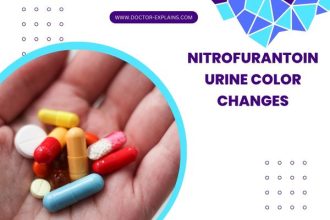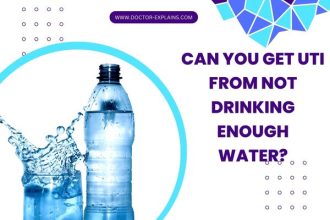As a kidney doctor, I often treat patients with urinary tract infections (UTIs) and prescribe medications like nitrofurantoin to help them recover.
Many patients ask if they can continue enjoying their daily coffee while taking this antibiotic.
In this article, I’ll discuss five key facts to help you understand the relationship between coffee and nitrofurantoin.
The short answer:
Generally, moderate coffee consumption is unlikely to significantly impact nitrofurantoin’s effectiveness. However, be aware of potential side effects and interactions, such as worsening UTI symptoms or increased gastrointestinal issues. Stay well-hydrated and consult your healthcare provider for personalized advice.
Key points in this article:
- No direct effect of coffee on nitrofurantoin
- Caffeine may worsen UTI symptoms (regardless of nitrofurantoin use)
- Nitrofurantoin may increase the side effects of caffeine
- Coffee may increase the gastrointestinal side effects of nitrofurantoin
- Low caffeine or decaf coffee is ok to drink while taking nitrofurantoin
Fact 1: No direct effect of coffee on nitrofurantoin.
There is no known direct interaction between coffee (or its primary active ingredient, caffeine) and nitrofurantoin. This means that consuming coffee doesn’t change how nitrofurantoin works in your body. However, this doesn’t mean that there are no indirect effects to consider, as we’ll explore in the following sections.
Fact 2: Caffeine may worsen UTI symptoms (regardless of nitrofurantoin use).
Caffeine is a diuretic, meaning it can increase urine production, potentially leading to dehydration if consumed in large amounts. Dehydration can exacerbate UTI symptoms, making it more uncomfortable and prolonging healing.
Additionally, caffeine is a bladder irritant, which may worsen symptoms like urgency and frequency in some individuals.
To minimize these potential complications:
- Drink plenty of water to stay well-hydrated
- Limit your caffeine intake, particularly if you’re prone to bladder irritation
- Monitor your symptoms and adjust your coffee consumption accordingly
Fact 4: Coffee may increase the gastrointestinal side effects of nitrofurantoin.
Nitrofurantoin can sometimes cause gastrointestinal side effects, such as nausea or stomach upset. Consuming coffee on an empty stomach may worsen these symptoms for some individuals. To avoid exacerbating gastrointestinal side effects:
- Avoid drinking coffee on an empty stomach
- Consume food or a small snack before enjoying your coffee
- Try drinking coffee later in the day, after you’ve eaten a meal
Moreover, drinking coffee during a UTI may increase the risk of caffeine side effects as your body is stressed (caused by infection).
Here are some of the common side effects of caffeinated coffee that you may experience during a UTI:
| Side Effect | Description |
|---|---|
| Jitteriness | Feeling restless, shaky, or nervous due to stimulation of the central nervous system. |
| Increased heart rate | Caffeine can increase the heart rate, which may be concerning for individuals with cardiovascular issues. |
| Insomnia | Difficulty falling asleep or staying asleep due to caffeine’s stimulating effects |
| Headaches | Caffeine withdrawal can cause headaches, as well as consuming too much caffeine. |
| Anxiety | Excessive caffeine consumption can lead to increased feelings of anxiety or nervousness. |
| Gastrointestinal issues | Coffee, especially on an empty stomach, can cause stomach upset, acid reflux, or diarrhea. |
| Increased urination | Caffeine is a mild diuretic, which may cause increased urination and, in extreme cases, dehydration. |
Fact 4: Low caffeine or decaf coffee is ok to drink while taking nitrofurantoin.
If you’re concerned about the potential side effects of caffeine while taking nitrofurantoin, consider switching to a low-caffeine or decaffeinated coffee option. These alternatives can still provide the enjoyable taste and ritual of drinking coffee, but with a reduced risk of exacerbating UTI symptoms or increasing side effects. However, monitoring your fluid intake and ensuring you get enough water to stay well-hydrated is still essential.
In conclusion, while coffee and nitrofurantoin have no direct interaction, it’s essential to be mindful of the potential side effects and complications that can arise from combining them. By staying well-hydrated, limiting caffeine intake, and monitoring your symptoms, you can still enjoy your daily cup of coffee and effectively treat your UTI with nitrofurantoin. As always, consult with your healthcare provider for personalized advice based on your medical history and any potential interactions with other medications you may be taking.





